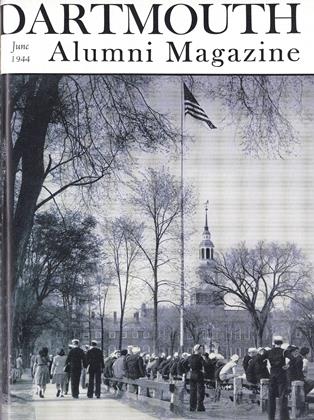DARTMOUTH AMONG 19 COLLEGES COOPERATING IN AID TO VETERANS
DARTMOUTH ALUMNI on the home front, interested in the future of college men who have been fighting in the war, are being urged to give tangible support to the program just announced by the Advisory Bureau for College Men Returning from the Services, located in Boston. The Dartmouth Vocational Plan continues to be the major project of the College for providing help to alumni veterans seeking employment after the war. The Advisory Bureau, announced in this article, is supplementary to the Dartmouth Plan and does not replace it. Its major activity will be carried on in Boston and surrounding New England communities. Its work will certainly be of great value in conjunction with the national vocational plan sponsored by the Dartmouth Alumni Council. The bureau, embracing alumni groups from nineteen leading eastern colleges and universities, aims first to offer free advice and guidance to those veterans wishing to continue educational careers. It aims further to direct returning college men—both undergraduates and graduates—to suitable positions that may lead to permanent careers in the fields of business and industry.
To function effectively, it is pointed out, all alumni groups must interest themselves in the project sufficiently to do the following:
I—Encourage college men who have returned from the war to consult the bureau in Boston, if feasible, either for help in determining the advisability of a return to college, or for aid in employment. a—List with the bureau, at its headquarters, the Harvard Club of Boston, 374 Commonwealth Avenue, those definite positions which they may have in their own business, or which they are able to locate through their contacts, to which the bureau may direct returned veterans.
Besides Dartmouth, the colleges and universities whose alumni groups are participating in the program include: Amherst, Boston College, Boston University, Bowdoin, Brown, Colgate, Cornell, Harvard, Holy Cross, University of Maine, M.1.T., Northeastern, Pennsylvania, Princeton, Tufts, Williams, Worcester Polytechnic Institute, and Yale.
The executive council consists of the following: E. T. Brackett (Brown), J. A. Canavan (Boston College), E. J. Shattuck 'l0 (Dartmouth), A. M. Hammer (Yale), C. H. Watkins (Harvard) chairman, and C. M. Werly (Cornell). John Shillito (Harvard), is executive secretary.
The organization is an outgrowth of the War Service Bureau which, during a ten months' period in 1942, interviewed more than 17,000 candidates for commissions in the armed forces in what amounted to an unofficial preliminary screening.
In explanation of its work, the executive council has released the following statement:
"The Advisory Bureau for College Men Returning from the Services is a practical attempt on the part of college men who remained behind on the home front to pay a debt to their college brothers who went off to war. The bureau is a place where one college man may unburden himself to another college man in an atmosphere which invites understanding and individual attention without the embarrassment of tests or the bother of complex forms to fill out.
"It is obvious that many who interrupted college careers to join the services no longer are suited to take up the broken threads of their former education. They are older, their family status may be different, their entire outlook on life itself may have changed. These are the men we will have to find positions for, so they may carve out new careers. Others, undecided in their own minds about the wisdom of returning to their studies, need encouragement which will send them back to college.
"The bureau can be effective, however, only if it has the full and active support of alumni. Every college graduate, especially the college man in an executive position, should consider it an obligation to inform the bureau about available positions in his own concern or any other organization he is in contact with. Without such help, the bureau cannot perform the task it has set for itself.
The executive council thinks it would be inadvisable to open the bureau at this time. Owing to the shortage of man power throughout the country, men returning from the services apparently are having no difficulty in securing jobs. As far as it is possible to ascertain, there are very few college men returning now. As soon as there is a need for the service we are prepared to start. You will be notified at that time through newspaper announcement.
 View Full Issue
View Full Issue
More From This Issue
-
 Lettter from the Editor
Lettter from the EditorRound the Girdled Earth
June 1944 -
 Article
ArticleLaureled Sons of Dartmouth
June 1944 By H. F. W. -
 Class Notes
Class Notes1943
June 1944 By EDWIN A. BOCK, WILLIAM T. MAECK -
 Article
ArticleDARTMOUTH'S SKIPPER
June 1944 By HERBERT W. HILL -
 Class Notes
Class Notes1917
June 1944 By MOTT D. BROWN JR., DONALD BROOKS -
 Class Notes
Class Notes1918
June 1944 By ERNEST H. EARLEY, DONALD L. BARR
Article
-
 Article
ArticleNewcomers Among Our Contributors
NOVEMBER 1929 -
 Article
ArticleHerbarium Gets New Plants
June 1931 -
 Article
ArticleContributions by Classes in the 1950 Alumni Fund Campaign
December 1950 -
 Article
Article116 Sons of Dartmouth Men in Freshman Glass
November 1953 -
 Article
ArticleThree New Dorms
February 1960 -
 Article
ArticleTIGER-INDIAN
February 1933 By J. S. M. '33

